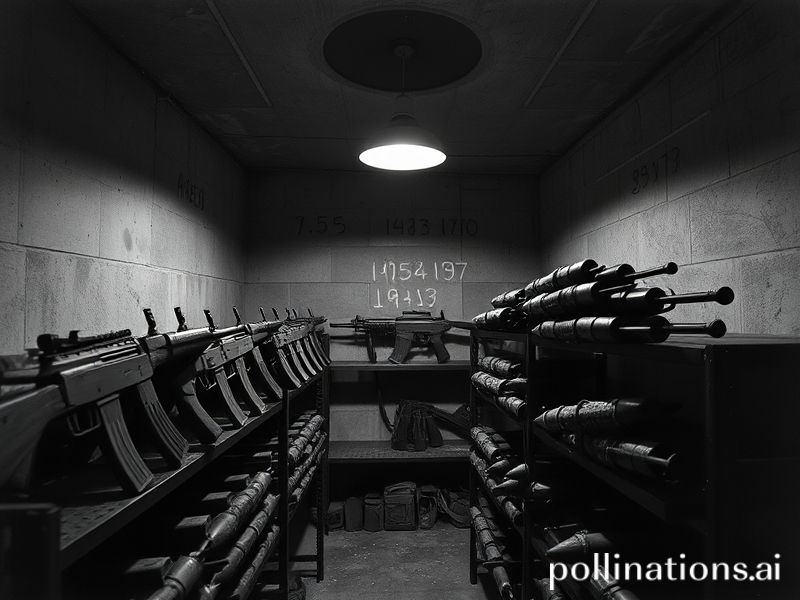The Global Bazaar of Bang: How Weapons Became the World’s Favorite Import-Export
The Global Bazaar of Bang, or How to Arm Your Neighbor in Five Easy Steps
By Our Man Somewhere Between the Hague and a Hardened Bunker
Geneva—Here, in the city that gave the world both the Red Cross and a 1.50-franc espresso, diplomats still pretend that weapons are merely “controlled commodities.” One floor above the gift shop that sells Swiss Army knives and cuckoo clocks, representatives from 193 nations sip bottled water and politely debate the fine print on the Arms Trade Treaty. Meanwhile, in a dusty port outside Odessa, a container labeled “agricultural machinery” is quietly re-stamped “school supplies” before its onward journey. Spoiler: the combine harvester inside has a suspiciously high rate of fire.
From Kyiv to Khartoum, Gaza to Guatemala City, weapons have become the Esperanto of our age—everyone speaks muzzle flash. International arms sales hit an all-time high last year at roughly $60 billion, according to the Stockholm International Peace Research Institute, which tracks these things the way other people track crypto. SIPRI’s analysts, bless their Scandinavian hearts, still feign surprise at every uptick, as if the planet had suddenly decided to take up competitive skeet shooting on an industrial scale.
Let us, for a moment, admire the supply chain. A trigger forged in the Czech Republic rides a flatbed through Poland, is married to a barrel turned in South Korea, then dressed up with American optics and a Turkish stock. The resulting rifle—let’s call it the “Omnicide 3000”—is marketed at trade shows with glossy brochures promising “freedom, democracy, and generous financing terms.” The booth girls smile like they’re selling timeshares in Antalya. Delegates from three different ministries pocket USB drives shaped like bullets and promise to “circle back after lunch.”
The beauty of globalization is that every village now has the chance to star in its own Quentin Tarantino reboot. Consider Haiti, where a modest shipment of pistols from Florida—technically “handguns for private security”—arrived just in time for the latest prime minister to discover that his government came with an ejector seat. Or take the Sahel, where French Mirage jets, American drones, and Russian mercenaries jostle for airspace like Uber drivers at JFK. The local pastoralists, whose goats have the life expectancy of a mayfly, can only conclude that the Cold War never ended; it just franchised.
Of course, the legal trade is only half the opera. The black market constitutes what economists politely label the “informal sector,” which is a bit like calling Chernobyl an “unscheduled fission event.” In the bazaars of Peshawar, a Chinese knock-off of a Belgian assault rifle—serial numbers filed off with the enthusiasm of a teenager forging a sick note—can be bartered for a sack of opium or, if you’re feeling nostalgic, two iPhone 12s and a carton of Marlboros. UN investigators, armed with clipboards and a per-diem, dutifully log every transaction, then upload the data to a cloud server that the Pentagon also uses for target practice.
Western governments insist they’ve tightened export controls. They have not. What they’ve done is hire larger PR firms. When a British missile “accidentally” levels a Yemeni wedding, a press release appears within hours blaming “faulty targeting data provided by regional partners.” Translation: we sold the bombs, they dropped them, now please look at this adorable royal baby. The moral algebra is breathtaking: each civilian casualty equals one parliamentary question plus a strongly worded petition. The weapons themselves remain unscathed, like celebrities after rehab.
And yet, for all the hand-wringing, weapons remain the planet’s most reliable investment. Shares in major defense contractors outperformed the S&P 500 by 58 percent last year—better returns than AI, crypto, or avocados. Analysts call it “geopolitical hedging”; cynics call it “murder futures.” Either way, your pension fund probably owns a slice of the next airstrike. Check the fine print under “diversified equities.” Congratulations, you’re a war profiteer; please collect your quarterly dividend at the moral lost-and-found.
In the end, the international arms trade is less about nations than about human nature’s two-for-one special: fear and profit. Every treaty, every embargo, every solemn promise to “do better next time” is just another layer of varnish on a coffin already en route. The weapons will travel, regimes will fall, and somewhere a new brochure will roll off the press, promising “peace of mind” in 5.56-millimeter increments. The only sure casualty is irony—shot repeatedly at close range.







